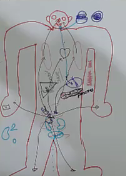Reflecting on the journey of parenthood, especially under the unique circumstances of raising children with special needs, offers an invaluable perspective on resilience, self-care, and the unwavering strength of love. In celebration of Parent Mental Health Day, we talked with Riz, our Development and Communications Manager, to share her family’s story, focusing on her challenges, triumphs, and lessons learned.
Her Story: The 3Rs of her Life

Doctor’s drawing – explanation to 7-year-old Rayn about his new condition.
Riz’s journey into the world of special needs parenting began with her firstborn, Rayn, whose diagnosis of Type 1 Diabetes at the tender age of seven marked the onset of a lifelong commitment to vigilant care and management. This condition thrust Riz into a realm of perpetual alertness, where monitoring blood sugar levels and ensuring Rayn’s health became as routine as breathing. The challenges of managing a chronic illness in a child introduced Riz to the complexities of healthcare, advocacy, and the emotional rollercoaster that parents in similar situations know all too well.
Amidst navigating the care for Rayn, Riz’s family dynamic evolved further with the birth of her second son, Rakan. Rakan’s entry into the family introduced a new dimension to the family dynamics. He did not have the same medical challenges as his older brother. Yet, he developed a profound understanding of empathy and responsibility. Subconsciously, he would feel responsible and constantly check if his brother was feeling fine.
Enter the last R. As if predestined by the trials already faced, Riz’s path took a more

Ranya’s progress from crawling on the floor to first movements with support and therapies.
profound turn with the birth of her daughter, Ranya. Ranya arrived into the world fighting battles from her first breath—battles characterized by severe developmental delays, hypotonic cerebral palsy, which affects muscle tone and movement, bilateral hearing loss, and low-functioning autism. These conditions layered Riz’s responsibilities with an even more complicated web of care requirements, enveloping the family in a world where speech therapists, physical therapists, occupational therapists, audiologists, and special education professionals became everyday figures. The diagnosis of Ranya not only demanded an escalation in the family’s engagement with various medical and therapeutic interventions but also necessitated a journey into the realms of sign language and alternative communication methods, ensuring Ranya could connect with the world around her in her unique way.

Rizwana with her son, Rakan
Ranya’s complex needs significantly influenced the family’s dynamics, affecting Rakan profoundly. Often referred to as a “glass child,” Rakan’s experiences were characterized by the dual reality of being both visible and invisible – seen in the family context but sometimes overshadowed by the pressing needs of his siblings. This dynamic posed its challenges. Riz strove to balance the attention and care among all her children, ensuring Rakan felt valued and recognized for his unique role in the family.
Although different from his siblings’, Rakan’s experiences were integral to the family’s collective resilience, love, and understanding narrative. Rayn, Rakan, and Ranya—each with their distinct paths, yet intertwined in a family story that speaks volumes of the challenges, joys, and profound learnings of raising children with special needs.
“Each of my children brought their own story, their own set of challenges and triumphs. With Rayn, it is learning the delicate balance of managing a life-altering condition like Type 1 Diabetes. Ranya teaches me the language of love without words and strength while overcoming her developmental and physical hurdles. And my Rakan shows me the importance of seeing and cherishing the quiet resilience in the spaces in between,” shares Riz.

The 3Rs
The Challenges Unveiled
Riz’s story is a relentless pursuit of wellness for her children. She speaks candidly about the emotional turmoil that accompanies the caregiving journey. “Fear was always there, like a shadow over everything in my life,” Riz explains, emphasizing how uncertainty is a constant part of parenting a child with a chronic condition.
Riz talks about feeling guilty as if it wrapped around her thoughts, making her second-guess every choice she made for her children. This feeling was made even heavier by despair, which quietly spread through her, making her struggle with feelings of hopelessness and helplessness.
Prioritizing Mental Health Amidst Caregiving
Caring for children with special needs placed a significant emotional and physical burden on Riz. The constant worry and the pressure to be an unwavering source of support for Rayn and Ranya often led her to neglect her well-being. However, she soon realized the importance of self-care and mental health for the sake of her family. Embracing her spirituality, she says finding solace in prayer helps her to maintain a sense of balance and purpose amidst the challenges.
Effective Self-Care Practices
During these years, several self-care practices proved to be particularly effective for her:
- Spiritual Practices: Engaging in prayer and deepening her spiritual connection gave her the strength and resilience to navigate her journey.
- Embracing Community Support: Joining support groups and meeting other parents of children with special needs offered her a sense of belonging and understanding that she was not alone.
- Education and Advocacy: Her knowledge of her children’s conditions empowered her to better advocate for their needs and well-being.
Balancing the demands of caregiving with personal well-being requires conscious effort. “It means recognizing my limits, setting boundaries, and making time for self-care rituals that replenish my strength,” shares Riz.
Her Advice to Other Parents
Her advice to other parents navigating similar paths is to embrace their vulnerability and allow themselves to seek and accept help. Prioritize mental health and find self-care practices that resonate with them. “We are not alone,” she says. “There is strength in community, and by sharing our stories and experiences, we can support each other through the challenges and celebrate the victories, no matter how small.”
Let this Parent Mental Health Day remind all parents of the importance of caring for themselves as they care for their loved ones, ensuring they can face the challenges with strength and love.
